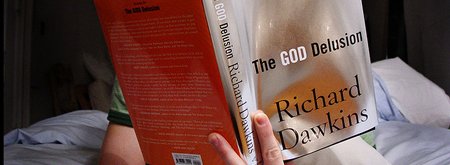The Dawkins Letters
The Dawkins Letters are a response to Richard Dawkins' book The God Delusion. The author, David Robertson, wrote a series of letters to Professor Dawkins, which were published on Dawkins' website. These letters have now been published in a slightly revised form in The Dawkins Letters.
15 November 2006
Dear Dr Dawkins,
Thanks for posting my letter on your website. That was very unexpected. Almost as unexpected as the response from some of your fellow atheists, as evidenced on your message board. Although some were intelligent, thoughtful and expressed their disagreement in a constructive and stimulating way, a surprising number reacted with all the vehemence of religious believers whose sacred holy book was being blasphemed. I thought I had seen vitriol before but this lot would take some beating. Anyway it’s not fair to judge a belief system by those of its advocates who are eccentric, extreme and in need of some kind of therapy. You would never do that with Christianity, would you?
I have also found it very interesting watching your ‘tour of the USA’. You will forgive me saying this, but it struck me that there are a number of similarities between your tour and some revivalist TV evangelist rallies. You have mass rallies to the converted (which you totally control), you mock those who disagree with you and refuse to engage with them in any constructive way, you demonise those who do not share your point of view, and you (or your advocates) exult at your book being at No. 5 in the New York Times Bestseller List and encourage people to go out and buy, and watch the latest video of ‘Dawkins Destroying Dumb Fundies’. I can even obtain special edition jacket covers and website banners. It’s highly entertaining – in the same way that ‘Reality’ or even ‘God TV’ can be, but it hardly constitutes rational argument and discussion. Still perhaps I am being a bit of a snob and failing to recognise that the purpose of the tour is not to engage with or dialogue those who do not agree with you, but rather to rally the troops and of course sell the book.
Anyway let us leave aside this rather commercial and politicised behaviour and not indulge in the view that because the methods are suspect, the message must be false. Let’s go to chapter one of your book. It’s a great beginning. Well written, well argued, informative and, much to my surprise, very persuasive. This is probably my favourite chapter. There is so much I can identify with and even say ‘Amen’ to! However, whilst I can accept and am convinced by some of the premises you state, I am less than convinced by some of the conclusions that you draw.
A Sense of Wonder – This is a key concept and you deal with it brilliantly. Many of us have been there. I remember as a boy being transfixed by the stars as I walked home across the Morich Moor in the Scottish Highlands. I lived on top of Nigg cliffs where I often sat looking out over the Cromarty Firth (an inlet leading to the North Sea), being utterly amazed at the beauty and variety in nature. The seagulls, the blue sea, the purple heather, the yellow gorse, the seals and even the occasional dolphin. It felt like paradise (even with the old World War II gun emplacements still deeply embedded in the cliffs). If you don’t feel a sense of wonder in such an environment you ain’t got no soul. You have obviously had the same experience – as I suspect most human beings have. But you interpret it differently. You think that to believe that God has created it and is responsible for such beauty is somehow to demean the beauty and explain away the sense of wonder. I must admit, that thought was not something new to me. I tried really hard to think the same thing. It seemed to me also that the ‘gods’ of religion were somehow trivial compared to such beauty and grace. And here’s the rub. They are. But neither could I replace them with humans. Darwin’s quote, which you cite, is an example of human arrogance at its worst:
Thus, from the war of nature, from famine and death, the most exalted object which we are capable of conceiving, namely the production of the higher animals, directly follows.
Is that really it? Is mankind the most exalted object which we are capable of conceiving? In the words spoken to Bob Geldof after Live Aid ‘Is that it?’ We can surely conceive of something higher than human beings. For a start there is Jesus Christ. I am reminded of a good man saying that if Jesus Christ was not real he would worship the man who invented him! Was I to be faced with the choice of man-made idols or human beings as the apex of creation? Neither was satisfactory. But where did this beauty come from? Why did I feel it? No one gives a better answer than Solomon, the wisest man who ever lived, “God has made everything beautiful in its time. He has also set eternity in the hearts of men; yet they cannot fathom what God has done from beginning to end” (Ecclesiastes chapter 3 verse 11).
I promise you I really tried hard to be an atheist, or at least an agnostic, but I just couldn’t get there. One New Year's Eve I even prayed to a God I was not sure even existed: “Oh God, if you are there, show me and I will serve you the rest of my life”. There was no voice from heaven. No flashing light. And as far as I could see the prayer remained unanswered. Until one Sunday I decided that after all I would go to church. I went to a small Scottish Presbyterian church beside the sea, down from those same cliffs, and as I listened to the sound of the plain singing of the psalms of the Bible, and heard the waves of the sea splashing against the walls of the church, it struck me what a fool I had been. Of course God existed. Nothing else made sense. You cannot explain beauty or evil, creation or humanity, time nor space, without God. Or at least you can, but to my mind the materialistic, atheistic explanation is emotionally, spiritually and above all intellectually inadequate. Indeed it takes a great deal of faith to be an atheist.
By the way I should point out that there is an interesting connection here between religion and science. Across the cliffs, on the other side of the Firth, is a small village called Cromarty. About 150 years ago there lived an extraordinary man called Hugh Miller. He was a genius. He had your gift for writing and he was also one of the founding fathers of modern geology. His books Old Red Sandstone and In the Footprints of the Creator are still classics. He was absolutely convinced that the geological evidence was for an old earth. Miller was an elder in the Free Church, editor of its newspaper and a strong political advocate for the Highlands peasants who were being cleared from their homes (in yet another example of the Selfish Gene principle at work). He loved science and found in it, not a contradiction of the Bible, but a complementarity.
You cite Carl Sagan from his Pale Blue Dot. It is worth quoting in full again:
How is it that hardly any major religion has looked at science and concluded, ‘This is much better than we thought! The Universe is much bigger than our prophets said, grander more subtle, more elegant.’? Instead they say, 'No, no, no! My god is a little god, and I want him to stay that way.’ A religion, old or new, that stressed the magnificence of the Universe as revealed by modern science might be able to draw forth reserves of reverence and awe hardly tapped by the conventional faiths.
That is brilliant. I would shout Hallelujah if it were not for the fact that this would immediately caricature me as a tub-thumping evangelical! I think the modern Christian church in the West has on the whole to hold up its hands and admit guilt. Mea culpa. We have too often reduced God to a formula, belief to a system, and worship to a happy-clappy feel-good floor show. Our God is too small. But that is because he is our God and not the God of the Bible. Not long after becoming a Christian I came to understand and appreciate the writings of John Calvin and others who followed his particular line of biblical teaching. I loved it. They portrayed the God of the Bible as magnificent, powerful, deep, glorious, sovereign, worthy of praise. They did not put him in a box, indeed they argued that by very definition God could not be boxed.
When I first became a Christian I thought I had it all worked out. I had God in a box. I had Jesus. But as I have grown and matured I realised that instead of me being in charge of the paddling pool, all I had done was dip my big toe into the ocean of God’s knowledge, love and being. The boxed small God does result in an antagonistic view to anything (including science) which will not fit into that box. But the unboxed God, the God of the Bible, allows, no, encourages us to explore his creation – to climb the heights and scale the depths. I think of the award-winning brilliant post doc biochemist. (I’m afraid that I cannot mention his name because such is the witch-hunt that is currently being orchestrated by some in British academic establishments against any scientist who could be deemed a ‘creationist’, it might actually be a threat to his career). He heard me waxing lyrical about the wonder of God in the stars and spoke to me afterwards. He told me that in his work, working with the smallest observable things known to man, he too was seeing the wonder and glory of God. Some of your followers have been trying to contrast science and Christianity with the rather foolish challenge “science has given us cars/toasters/spacecraft etc, what has religion ever given us?” It is foolish because they are making a false dichotomy between science and Christianity as though science is one belief system and Christianity another. No. The difference is not in terms of science but in terms of philosophy and belief. The danger of the position that you are advocating is that you want to drive a wedge between science and religion to suit your own philosophy (of course in that you are joined by some religious fundamentalists). But your position is philosophical not scientific.
Let me leave this section on wonder by suggesting that you and Mr Sagan could do a lot worse than read the greatest philosophical mind that America has ever produced – Jonathan Edwards. If any human being grasped something of the grandeur of God it was Edwards. Take this from his work True Virtue:
For as God is infinitely the Greatest Being, so he is … infinitely the most beautiful and excellent. All the beauty to be found throughout the whole creation is but a reflection of the diffused beams of that Being who hath an infinite fullness of brightness and glory. God is the foundation of all beauty and glory.
Now let's turn to your use of the term religious. Again I agree with most of what you say here. It is all about how we use and understand the term ‘God’. I accept fully that too many Christians have been guilty of selective quotation, and circulation of urban myths, in order to prove that this or that famous person was either a Christian or had a death bed conversion. Your evidence re Einstein seems absolutely convincing and it means that I will have to be careful about using such quotes as ‘Science without religion is lame, religion without science is blind.’ Although I am convinced that you are right about this and indeed about many ‘religious’ people who only use the term ‘god’ as a synonym for their own ‘religious’ feelings or sense of wonder, yet I am not convinced that this sense of wonder is something that is just a product of our natural being / environment. You state that naturalists believe that everything is physical. I think of one highly intelligent chemist who when challenged on this admitted that love, hate, beauty, spirituality et al were all in the end ‘just’ chemical reactions. This seems to me a profoundly depressing minimalist view of the universe and of human life. Of course if you could prove it and evidence that there was no personal God then I guess we would have to live with it. But you cannot. Your view that the universe is only physical is a hypothesis and one that is largely based on wishful thinking. In fact your position is kind of a ‘science of the gaps’. There are certain things you observe, you cannot really explain them scientifically and you do not want to resort to explaining them spiritually (because you have it as a basic philosophical presupposition that nothing exists except matter), so rather than leave any gaps (through which you fear a small god might slip) you basically expand your scientific knowledge so that it becomes a theory of everything – and you conveniently shut out anything which does not fit in that box. Ironically the very thing that you accuse Christians of doing with God, putting him into a box, is something that you are in danger of doing with science, creating a human construct based upon your anti-religious presuppositions, which in turn boxes science.
Whilst I agree in general with the section on the use of the term ‘god’ there are a couple of remarks which do not hold up. For example you state that "the notion that religion is a proper field, in which one might claim expertise, is one that should not go unquestioned". Here your hatred for religion has gone slightly over the top. Given that the majority of the world over the majority of history and still today has been religious, one would have thought it is a reasonable field for study and that there are some who can claim some degree of expertise in it. Indeed your dismissal of any who do is a neat trick which will allow you to critique religions and religious books, without having to resort to any kind of academic scholarship because after all religion is not a proper field. This then of course allows you to get away with simplistic statements such as ‘pantheism is just sexed up atheism’. Given your earlier definition of atheists as being naturalists who hold to the notion that there is only the material you will find that there are many pantheists who are not atheists. They believe in numerous spirits, gods and not material things.
I also find that you have an interesting use of quotations. You cite letters from an American Roman Catholic and the president of a historical society. I am sure they are not the only letters sent by those who disagreed with Einstein’s views but they are the ones you selected. Why? Because they allow you to imply or assert that Christians are either ignorant or full of ‘intellectual and moral cowardice’. It is the classic ad hominem argument. Look how stupid these Christians are, therefore God cannot exist. I, as a Christian, do not agree with either the tone or the substance of those letters, and I know of very few Christian scholars who would (but you already covered your bases with that one by declaring there is no such thing as Christian scholarship!). In particular the oft cited, but biblically false assertion “as everyone knows, religion is based on Faith, not knowledge”. I would argue the opposite – faith without knowledge is blind and stupid. Biblical faith is in a person. If you do not know about that person you cannot have faith in him.
How would you feel if I took some of the more ludicrous and ignorant comments from some of the atheists on your website and used them as an example of how atheism rots the brain? It would not be fair nor honest. By the way I would also like to acknowledge that I have received some kind, thoughtful and intelligent letters from other atheists.
I’m afraid that I am going to have to leave it there. One final thought. You claim to be a religious non-believer. That to me is the worst of both worlds. I hate religion. I think that Marx was in some sense right – religion has far too often been used as the opiate of the people. In the name of religion a great deal of evil and harm has been done. But I do believe. I believe in the God of the Bible. I find that his revelation of himself in both the creation and scripture is wonderfully liberating and best fits the facts as far as I can see them. You may aspire to be a religious non-believer. I am delighted to be a non-religious believer.
All the best,
David
Go to Part 3
© 2007 David Robertson



